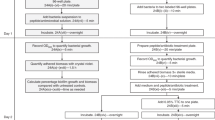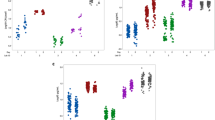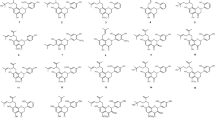Abstract
RECENTLY1 we published a method which was specially designed to estimate the anti-bacterial activity of certain fungi, for example, the Basidiomycetes, which are difficult to grow on liquid media. Briefly, the method consisted in cutting a disk from a growing fungus colony and dropping it into a plate of warm agar which had been bulk-seeded with bacteria. In case of a positive result a zone of bacterial inhibition was produced round the disk. The method stated that "all disks are cut at approximately the same distance from the edge of the colony". An attempt to determine what distance from the edge of the colony would give the best result brought out certain objections to the method and led to the present modification.
This is a preview of subscription content, access via your institution
Access options
Subscribe to this journal
Receive 51 print issues and online access
$199.00 per year
only $3.90 per issue
Buy this article
- Purchase on Springer Link
- Instant access to full article PDF
Prices may be subject to local taxes which are calculated during checkout
Similar content being viewed by others
References
Wilkins, W. H., and Harris, G. C. M., Nature, 153, 590 (1944).
Author information
Authors and Affiliations
Rights and permissions
About this article
Cite this article
WILKINS, W., HARRIS, G. A Modification of the Method for Estimating the Anti-Bacterial Activity of Fungi that are Difficult to Grow on Liquid Media. Nature 154, 578–579 (1944). https://doi.org/10.1038/154578a0
Issue Date:
DOI: https://doi.org/10.1038/154578a0
Comments
By submitting a comment you agree to abide by our Terms and Community Guidelines. If you find something abusive or that does not comply with our terms or guidelines please flag it as inappropriate.



